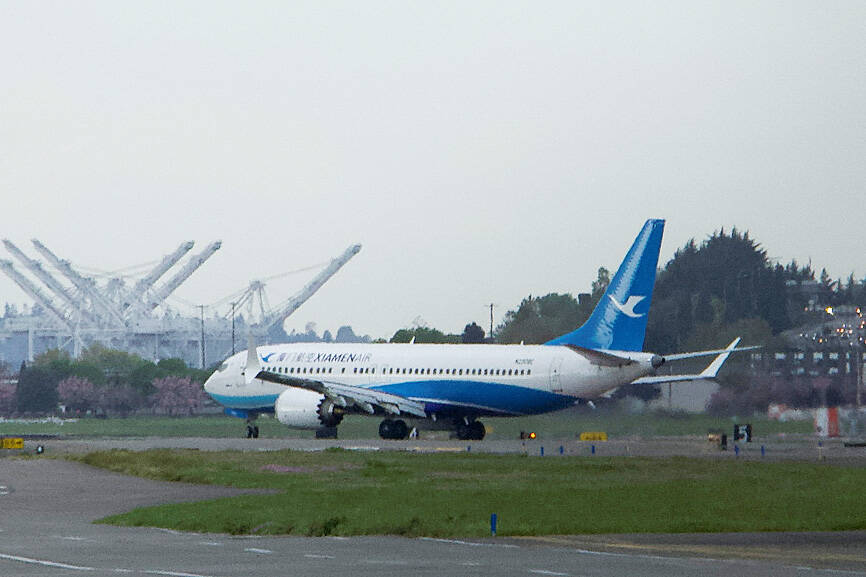A Boeing Co jet intended for use by a Chinese airline landed back at the planemaker’s US production hub yesterday, a victim of the tit-for-tat bilateral tariffs launched by US President Donald Trump in his global trade offensive.
The 737 MAX, which was meant for China’s Xiamen Airlines, landed at Seattle’s Boeing Field at 6:11pm, according to a Reuters witness. It was painted with the XiamenAir livery.
The jet, which made refueling stops in Guam and Hawaii on its 8,000km return journey, was one of several 737 MAX jets waiting at Boeing’s completion center in Zhoushan, China, for final work and delivery to a Chinese carrier.

Photo: REUTERS
Trump this month raised baseline tariffs on Chinese imports to 145 percent. In retaliation, China has imposed a 125 percent tariff on US goods. A Chinese airline taking delivery of a Boeing jet could be crippled by the tariffs, given that a new 737 MAX has a market value of around US$55 million, according to aviation consultancy IBA Group Ltd.
It is not clear which party made the decision for the aircraft to return to the US. Boeing and XiamenAir did not respond to requests for comment.
The return of the 737 MAX, Boeing’s best-selling model, is the latest sign of disruption to new aircraft deliveries from a breakdown in the aerospace industry’s decades-old duty-free status.
Confusion over changing tariffs could leave many aircraft deliveries in limbo, with some airline CEOs saying they would defer delivery of planes rather than pay duties.
Moreover, commercial plane prices, already lifted in recent years due to pandemic supply chain shocks, are poised to climb further as Boeing and Airbus SE are buffeted by trade tariffs.
“Compared with 2018, prices for commercial jets have risen by around 30 percent,” an aviation expert told AFP on condition of anonymity.
The US and European aerospace giants have grappled with higher expenses for primary materials such as titanium, components and energy, as well as overall labor cost pressures.
Richard Aboulafia, managing director at consultancy AeroDynamic Advisory LLC, said items that have inflated “at a particularly high rate” include castings, forgings and “anything titanium... especially since all that Russian capacity has been cut off from the US and, to a lesser extent, from Europe.”
Aboulafia estimates prices for materials and equipment have risen 40 percent since 2021. That was before Trump’s 25 percent tariffs on steel and aluminum, which are used in planes.
“It’s kind of ironic, raw materials were not a problem, but Donald Trump is determined to make them a problem,” Aboulafia said.
Inflation in aviation has been accelerating, and “that’s only going to get worse with these tariffs that are being imposed,” Aircraft Value News editor-in-chief John Persinos said. “These tariffs are disastrous.”
Additional reporting by AFP

DIVIDED VIEWS: Although the Fed agreed on holding rates steady, some officials see no rate cuts for this year, while 10 policymakers foresee two or more cuts There are a lot of unknowns about the outlook for the economy and interest rates, but US Federal Reserve Chair Jerome Powell signaled at least one thing seems certain: Higher prices are coming. Fed policymakers voted unanimously to hold interest rates steady at a range of 4.25 percent to 4.50 percent for a fourth straight meeting on Wednesday, as they await clarity on whether tariffs would leave a one-time or more lasting mark on inflation. Powell said it is still unclear how much of the bill would fall on the shoulders of consumers, but he expects to learn more about tariffs

NOT JUSTIFIED: The bank’s governor said there would only be a rate cut if inflation falls below 1.5% and economic conditions deteriorate, which have not been detected The central bank yesterday kept its key interest rates unchanged for a fifth consecutive quarter, aligning with market expectations, while slightly lowering its inflation outlook amid signs of cooling price pressures. The move came after the US Federal Reserve held rates steady overnight, despite pressure from US President Donald Trump to cut borrowing costs. Central bank board members unanimously voted to maintain the discount rate at 2 percent, the secured loan rate at 2.375 percent and the overnight lending rate at 4.25 percent. “We consider the policy decision appropriate, although it suggests tightening leaning after factoring in slackening inflation and stable GDP growth,”

Meta Platforms Inc offered US$100 million bonuses to OpenAI employees in an unsuccessful bid to poach the ChatGPT maker’s talent and strengthen its own generative artificial intelligence (AI) teams, OpenAI CEO Sam Altman has said. Facebook’s parent company — a competitor of OpenAI — also offered “giant” annual salaries exceeding US$100 million to OpenAI staffers, Altman said in an interview on the Uncapped with Jack Altman podcast released on Tuesday. “It is crazy,” Sam Altman told his brother Jack in the interview. “I’m really happy that at least so far none of our best people have decided to take them

As they zigzagged from one machine to another in the searing African sun, the workers were covered in black soot. However, the charcoal they were making is known as “green,” and backers hope it can save impoverished Chad from rampant deforestation. Chad, a vast, landlocked country of 19 million people perched at the crossroads of north and central Africa, is steadily turning to desert. It has lost more than 90 percent of its forest cover since the 1970s, hit by climate change and overexploitation of trees for household uses such as cooking, officials say. “Green charcoal” aims to protect what